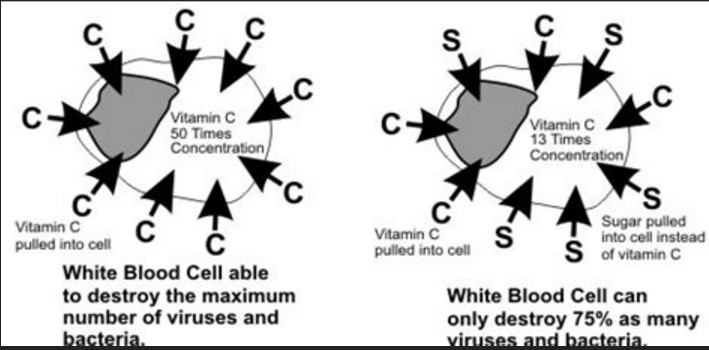维生素C是免疫系统的“肌肉”
Vitamin C is the 'muscle' of the immune system
2014年2月21日,Thomas Levy 托马斯·利维博士大量的研究(大部分发生在半个多世纪以前)已经明确表明,大量服用和服用维生素C可以治愈大多数急性感染,无论是病毒感染还是其他疾病,并能迅速中和大多数接触到的毒素——包括许多危及生命的健康问题。实际上,维生素C不仅仅是一种抗氧化剂。为什么主流医学拒绝接受维生素C的救生能力还不清楚。
避免得病的真相
关于避免疾病的不可避免的真相,所有医生和普通人都认同的一个事实是,强大的免疫系统对于从感染中恢复、中和和清除毒素、使患病细胞恢复健康至关重要。毫无疑问,一个有能力的免疫系统是阻止疾病发展和控制的最好方法。因此,任何 显著增强免疫系统并提高其实现这些目标的能力的东西,在逻辑上也应该得到护理人员和患者的共同支持。
维生素C和免疫系统除了作为主要的抗氧化剂在体内循环外,科学文献已经明确确定维生素C可以直接促进和刺激免疫系统的一些非常重要的功能。这些 功能包括:
1. 增强抗体生成(B淋巴细胞,体液免疫)
2. 增强干扰素生产
3. 增强吞噬细胞(清除细胞)功能
4. 增强T淋巴细胞功能(细胞介导免疫)
5. 增强的B淋巴细胞和T淋巴细胞增殖。增强自然杀伤细胞(NK细胞)活性(非常重要的抗癌功能)
6. 增强前列腺素的形成
7. 通过吞噬细胞增加一氧化氮的生成
为什么维生素C是强大免疫力的关键?
红细胞的维生素C浓度与周围的血浆大致相同。心脏细胞和肾脏细胞是新陈代谢活跃的细胞,它们的维生素C含量是血浆的13倍,这是一个惊人的浓度差异。这肯定与 这些活性细胞对电子的持续需求是一致的。吞噬白细胞(粒细胞)的维生素C含量是血浆的25倍。由于这些细胞需要大量的能量来 清除和消化病原体和细胞“碎片”,这种维生素C的浓度也很有意义。然而,维生素C集中器之王是循环单核细胞,另一种具有吞噬功能的细胞,当它进入组织时。与血浆相比,这个细胞中维生素C的浓度增加了80倍以上。很少(如果有的话)有其他的循环营养素/维生素如此有选择地集中在特定的细胞类型的例子存在。
维生素C如何充当“救命恩人”
每当炎症发生时,氧化应激就会增加,炎症部位的维生素C储备就会急剧减少,直至消失。免疫系统首先动员到急性炎症区域的细胞是单核细胞。那么,作为一种假设的可能性,免疫系统的这种早期、最初的功能似乎是用一种维生素C“传递系统”——单核细胞——来补偿被耗尽的维生素C发炎区域。这一概念也与许多其他免疫细胞也显著增加维生素C浓度的事实相吻合。
无论你选择什么“健康计划”,都要摄入维生素C。有很多事情你可以做和/或消费来帮助你实现你所追求的健康。然而,你不应该因为你的健康计划无法改善而感到完全舒服。在分子水平上的电子捐赠,这是任何治疗方案的最终积极影响,是抗氧化作用。你总是想要更多的电子捐赠和更少的电子消耗(氧化)。虽然维生素C不是唯一的抗氧化剂,但它的电子捐赠/流动比其他任何东西都好,而且它仍然是非常便宜的,尽管人们一再试图让它更贵,并将其作为“维生素C复合物”或“天然”维生素C进行营销。
维生素C真的是“由大自然设计的”——因为大多数动物会根据需要合成这种必需的营养物质。不幸的是,人类失去了这种能力,但我们仍然需要尽最大努力来应对我们每天的抗氧化需求。
引用:利维,T.(2001)最佳健康营养。纽约,纽约:麦格劳-希尔出版社http://healthimpactnews.com/2013/sweden-becomes-first-western-nation-to-reject-low-fat-diet-dogma-in-favor-of-low-carb-high-fat-nutrition/https://www.peakenergy.com/articles/nh20140222/Vitamin-C-is-the- -of-the-im“肌肉”
Vitamin C is the 'muscle' of the immune system
February 21, 2014 by Dr. Thomas Levy
A very large body of work, much of it taking place over a half-century ago, has clearly established that the vigorous dosing and administration of vitamin C can cure most acute infections, viral or otherwise, and promptly neutralize most toxin exposures - including many life-threatening health issues.
Behind the scenes, vitamin C is more than 'just' an antioxidant. Why mainstream medicine refuses to embrace the life-saving abilities of vitamin C remains unclear. But, the validity of the scientific data is absolutely inescapable.
The inescapable truth about avoiding disease
One fact that all doctors and all lay persons agree on is that a strong immune system is key to recovering from an infection, neutralizing and eliminating a toxin, and bringing diseased cells back to a state of good health. There also is no dispute that a competent immune system is the best way to keep a disease from developing and taking hold in the first place.
Therefore, anything that clearly strengthens the immune system and improves its ability to achieve these goals should logically be embraced as well by both the caregiver and the patient.
Vitamin C and the immune system
In addition to its role as the premier antioxidant circulating throughout the body, the scientific literature has clearly established vitamin C to directly promote and stimulate a number of very important functions of the immune system. These functions include the following:
1. Enhanced antibody production (B-lymphocytes, humoral immunity)
2. Enhanced interferon production
3. Enhanced phagocytic (scavenger cell) function
4. Enhanced T-lymphocyte function (cell-mediated immunity)
5. Enhanced B-lymphocyte and T-lymphocyte proliferation6. Enhanced natural killer cell activity (very important anti-cancer function)
6. Enhanced prostaglandin formation
7. Enhanced nitric oxide production by phagocytes
Why is vitamin C the key to powerful immunity?
Red blood cells have roughly the same concentration of vitamin C as the surrounding plasma. Heart cells and kidney cells, which are very metabolically active cells, have about 13-fold more vitamin C than the plasma, an impressive concentration difference. This is certainly consistent with the continual need for electrons in such active cells.
Phagocytic white blood cells (granulocytes) have 25-fold more vitamin C than the plasma. Since these cells need an abundance of energy to consume and digest pathogens and cellular "debris," this concentration of vitamin C makes a lot of sense as well.
The king of the vitamin C concentrators, however, is the circulating monocyte, which becomes known as a macrophage, another cell with phagocytic functions, when it settles into the tissues. This cell has more than an 80-fold increased concentration of vitamin C inside it relative to the plasma. Few, if any, other examples of a circulating nutrient/vitamin being so selectively concentrated in a given cell type exist.
How vitamin C acts as a 'lifesaver'
Whenever inflammation develops, oxidative stress is increased, and vitamin C stores of the inflamed areas are acutely depleted to absent. The first cells that the immune system mobilizes to areas of acute inflammation are the monocytes.
As a hypothetical possibility, then, it would appear that this early, initial function of the immune system is to compensate for the inflamed area depleted of vitamin C with a vitamin C 'delivery system': the monocyte. This concept also meshes quite well with the fact that many other immune cells have significantly increased concentrations of vitamin C as well.
Always include vitamin C in whatever "wellness program" you choose to follow.
There are many things you can do and/or consume to help you achieve the health and wellness you seek. However, you should never be completely comfortable that your health program cannot be improved upon.
Donation of electrons at the molecular level, which is the ultimate positive impact of any therapeutic protocol, is the antioxidant effect. You always want more electron donation and less electron depletion (oxidation). Vitamin C, while not the only good antioxidant you can supplement, performs this electron donation/flow better than anything else available, and it still remains very affordable, in spite of repeated attempts to make it more expensive and market it as a "vitamin C complex" or "natural" vitamin C.
Vitamin C is truly 'designed by nature' – as most animals synthesize this essential nutrient as needed. Humans, unfortunately, lost this ability, but we still need to cope as best we can for our daily antioxidant needs.
References:
Levy, T. (2001) Optimal Nutrition for Optimal Health. New York, NY: McGraw-Hill Publishing
http://healthimpactnews.com/2013/sweden-becomes-first-western-nation-to-reject-low-fat-diet-dogma-in-favor-of-low-carb-high-fat-nutrition/
https://www.peakenergy.com/articles/nh20140222/Vitamin-C-is-the-'muscle'-of-the-immune-system

.png)